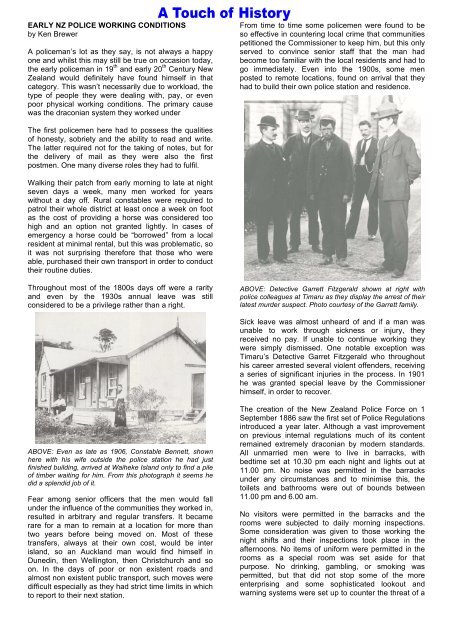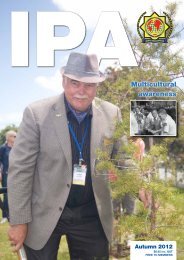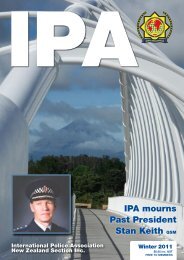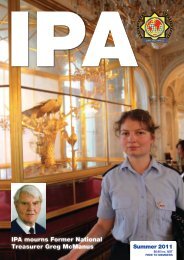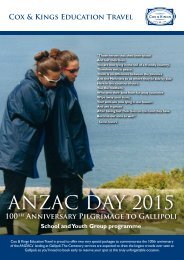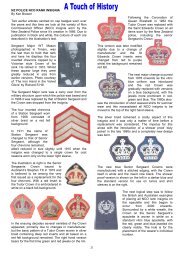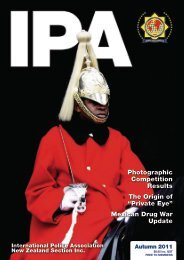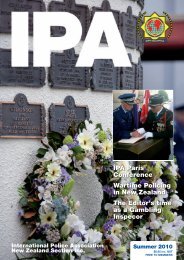The full article can be read here - Ipa.org.nz
The full article can be read here - Ipa.org.nz
The full article can be read here - Ipa.org.nz
Create successful ePaper yourself
Turn your PDF publications into a flip-book with our unique Google optimized e-Paper software.
EARLY NZ POLICE WORKING CONDITIONS<br />
by Ken Brewer<br />
A policeman’s lot as they say, is not always a happy<br />
one and whilst this may still <strong>be</strong> true on occasion today,<br />
the early policeman in 19 th and early 20 th Century New<br />
Zealand would definitely have found himself in that<br />
category. This wasn’t necessarily due to workload, the<br />
type of people they were dealing with, pay, or even<br />
poor physical working conditions. <strong>The</strong> primary cause<br />
was the draconian system they worked under<br />
From time to time some policemen were found to <strong>be</strong><br />
so effective in countering local crime that communities<br />
petitioned the Commissioner to keep him, but this only<br />
served to convince senior staff that the man had<br />
<strong>be</strong>come too familiar with the local residents and had to<br />
go immediately. Even into the 1900s, some men<br />
posted to remote locations, found on arrival that they<br />
had to build their own police station and residence.<br />
<strong>The</strong> first policemen <strong>here</strong> had to possess the qualities<br />
of honesty, sobriety and the ability to <strong>read</strong> and write.<br />
<strong>The</strong> latter required not for the taking of notes, but for<br />
the delivery of mail as they were also the first<br />
postmen. One many diverse roles they had to fulfil.<br />
Walking their patch from early morning to late at night<br />
seven days a week, many men worked for years<br />
without a day off. Rural constables were required to<br />
patrol their whole district at least once a week on foot<br />
as the cost of providing a horse was considered too<br />
high and an option not granted lightly. In cases of<br />
emergency a horse could <strong>be</strong> “borrowed” from a local<br />
resident at minimal rental, but this was problematic, so<br />
it was not surprising t<strong>here</strong>fore that those who were<br />
able, purchased their own transport in order to conduct<br />
their routine duties.<br />
Throughout most of the 1800s days off were a rarity<br />
and even by the 1930s annual leave was still<br />
considered to <strong>be</strong> a privilege rather than a right.<br />
ABOVE: Detective Garrett Fitzgerald shown at right with<br />
police colleagues at Timaru as they display the arrest of their<br />
latest murder suspect. Photo courtesy of the Garrett family.<br />
Sick leave was almost unheard of and if a man was<br />
unable to work through sickness or injury, they<br />
received no pay. If unable to continue working they<br />
were simply dismissed. One notable exception was<br />
Timaru’s Detective Garret Fitzgerald who throughout<br />
his career arrested several violent offenders, receiving<br />
a series of signifi<strong>can</strong>t injuries in the process. In 1901<br />
he was granted special leave by the Commissioner<br />
himself, in order to recover.<br />
ABOVE: Even as late as 1906, Constable Bennett, shown<br />
<strong>here</strong> with his wife outside the police station he had just<br />
finished building, arrived at Waiheke Island only to find a pile<br />
of tim<strong>be</strong>r waiting for him. From this photograph it seems he<br />
did a splendid job of it.<br />
Fear among senior officers that the men would fall<br />
under the influence of the communities they worked in,<br />
resulted in arbitrary and regular transfers. It <strong>be</strong>came<br />
rare for a man to remain at a location for more than<br />
two years <strong>be</strong>fore <strong>be</strong>ing moved on. Most of these<br />
transfers, always at their own cost, would <strong>be</strong> inter<br />
island, so an Auckland man would find himself in<br />
Dunedin, then Wellington, then Christchurch and so<br />
on. In the days of poor or non existent roads and<br />
almost non existent public transport, such moves were<br />
difficult especially as they had strict time limits in which<br />
to report to their next station.<br />
<strong>The</strong> creation of the New Zealand Police Force on 1<br />
Septem<strong>be</strong>r 1886 saw the first set of Police Regulations<br />
introduced a year later. Although a vast improvement<br />
on previous internal regulations much of its content<br />
remained extremely draconian by modern standards.<br />
All unmarried men were to live in barracks, with<br />
<strong>be</strong>dtime set at 10.30 pm each night and lights out at<br />
11.00 pm. No noise was permitted in the barracks<br />
under any circumstances and to minimise this, the<br />
toilets and bathrooms were out of bounds <strong>be</strong>tween<br />
11.00 pm and 6.00 am.<br />
No visitors were permitted in the barracks and the<br />
rooms were subjected to daily morning inspections.<br />
Some consideration was given to those working the<br />
night shifts and their inspections took place in the<br />
afternoons. No items of uniform were permitted in the<br />
rooms as a special room was set aside for that<br />
purpose. No drinking, gambling, or smoking was<br />
permitted, but that did not stop some of the more<br />
enterprising and some sophisticated lookout and<br />
warning systems were set up to counter the threat of a
sergeant’s unannounced visit. When off duty they were<br />
not permitted to travel further than one quarter mile<br />
from their barracks under any circumstances and they<br />
were not to take any Police equipment with them. If<br />
granted leave, upon reaching their destination, they<br />
were ordered to report immediately to the nearest<br />
Police Station for duty if required.<br />
Regulations for those Constables working the <strong>be</strong>at<br />
stated, “Constables will not whilst on duty, enter into a<br />
conversation with any person whatever, except on<br />
matters relative to his duty, but will immediately give<br />
his name and num<strong>be</strong>r if asked.”<br />
Regulation 207 stated, “Orange peel and other fruit<br />
skins should <strong>be</strong> removed from the footways by the<br />
constable to prevent accidents.”<br />
Mounted Constables meanwhile had their own specific<br />
instruction: “No Police horse is to <strong>be</strong> ridden above five<br />
miles an hour unless in an emergency.” <strong>The</strong> 1913<br />
Regulation 344 caused amusement in modern times<br />
and <strong>read</strong>: “No Constable shall <strong>be</strong> permanently<br />
mounted or dismounted without the approval of the<br />
Commissioner, but officers in charge of stations may<br />
mount any Constable in cases of emergency.”<br />
Marriage created a few additional obstacles and t<strong>here</strong><br />
will <strong>be</strong> many retired police mem<strong>be</strong>rs <strong>read</strong>ing this who<br />
served in the 1950 and 1960s that will remem<strong>be</strong>r the<br />
requirement to ask permission to marry and to provide<br />
<strong>full</strong> details of the bride’s family in order for them to <strong>be</strong><br />
vetted <strong>be</strong>fore approval was granted. Sometimes it was<br />
refused and the marriage could only <strong>be</strong> achieved<br />
through resignation.<br />
Once married they had to rely solely on the man’s<br />
single income for if his wife were to receive any<br />
personal work related income he was required to<br />
resign immediately. If they divorced, or the wife died,<br />
he was required in the bigger centres to report that<br />
same day to live in the barracks – even <strong>be</strong>fore the<br />
funeral!<br />
the Royal Irish Constabulary and immigrated to New<br />
Zealand with his wife and two children in 1870. During<br />
the voyage on the ship Babbington, their first two<br />
children drowned in their cabin during a storm.<br />
<strong>The</strong>y settled in Northland w<strong>here</strong> he took up a role as<br />
Gaoler and his wife <strong>be</strong>came New Zealand’s first hotel<br />
manager when she ran the Duke of Marlborough Hotel<br />
in Russell. He joined the New Zealand Constabulary<br />
Force on 13 Novem<strong>be</strong>r 1885 and was transferred to<br />
Pukekohe on 1 Octo<strong>be</strong>r 1886. By the time of his<br />
retirement in 1911 they had another seventeen<br />
children! OK, so his life may have <strong>be</strong>en more pleasant<br />
than most!<br />
With the Pukekohe police residence (and his police<br />
wage) far too small to maintain such a large family,<br />
they were given dispensation to occupy and live in a<br />
large building in the town on Dominion Road, from<br />
w<strong>here</strong> his wife operated dining rooms and hotel style<br />
accommodation throughout his police career.<br />
When women were permitted to join the ranks from<br />
1940, a new set of issues arose around fraternisation.<br />
<strong>The</strong>re were severe limitations placed on them in the<br />
early stages and when they were finally permitted to<br />
walk the <strong>be</strong>at, they had to <strong>be</strong> accompanied by a male.<br />
As they had no uniform, this meant a plain clothes<br />
detective was taken off his duties to chaperone them.<br />
However, it quickly<br />
dawned on senior<br />
officers that such a<br />
situation was “risky”<br />
so a second<br />
policewoman had to<br />
<strong>be</strong> present at all<br />
times, resulting in<br />
three staff mem<strong>be</strong>rs<br />
doing the work of one.<br />
<strong>The</strong> male detective<br />
watching the first<br />
police woman and the<br />
second watching the<br />
detective!<br />
ABOVE: Detective Gordon Fraser with Molly Speakman at<br />
left and Nora Crawford at right on <strong>be</strong>at duty at Auckland<br />
<strong>be</strong>fore uniforms were issued. Photograph courtesy of the<br />
late Nora Crawford.<br />
In later years when marriage<br />
<strong>be</strong>tween police colleagues<br />
arose, the administration did<br />
it’s utmost to prevent it then<br />
made life difficult for those<br />
who did marry.<br />
ABOVE: A newspaper photograph of the McGovern home,<br />
hotel and tearooms in Pukekohe during late 1981 just prior to<br />
demolition. Photograph courtesy of the Franklin Times.<br />
One known exception to several of these regulations<br />
was Constable Patrick John McGovern of Pukekohe<br />
who arrived t<strong>here</strong> on 1 Octo<strong>be</strong>r 1886 and remained<br />
until his retirement on 30 April 1911. He had served in<br />
RIGHT: Nora Crawford of<br />
Auckland married husband<br />
Dougal who was stationed at<br />
Waiuku, but the happy couple<br />
had to live apart for two years<br />
until he obtained a transfer back<br />
to the city. Photograph courtesy<br />
of the late Nora Crawford.
When Constable Madeline Bines married Sergeant<br />
Don Bradley at Auckland in 1953, the event was<br />
attended by many of her colleagues. However at the<br />
reception she was handed a letter written by<br />
Commissioner Compton instructing her to resign, as<br />
policy dictated that policewomen should <strong>be</strong> single or<br />
widowed. She refused and only after many months of<br />
intense and difficult argument by the fledgling Police<br />
Association, did the Commissioner back down. Whilst<br />
she was to remain at Auckland, husband Don was<br />
transferred to the Wharf to ensure they did not work<br />
together. It was not unknown for one partner in a<br />
marriage to <strong>be</strong> sent to serve in the South Island and<br />
the other in the North in an attempt to force one to<br />
resign.<br />
<strong>The</strong> day to day working life of police staff was affected<br />
in many other ways. Up to the WWI era and <strong>be</strong>yond,<br />
staff at one man stations, were responsible for paying<br />
their own power and heating costs, despite the<br />
building also <strong>be</strong>ing the local police station. Wives were<br />
responsible for cleaning the police cells and feeding<br />
any prisoners held t<strong>here</strong> and it was post WWII <strong>be</strong>fore<br />
they <strong>be</strong>gan to receive any compensatory allowance for<br />
it.<br />
Even in the area of equipment the Department<br />
adopted some odd practices. All notebook entries<br />
were written in pencil, often the indelible kind, which<br />
when the lead was made wet would write in a form of<br />
ink that could not <strong>be</strong> erased. <strong>The</strong>se were expensive,<br />
so in order to obtain a replacement pencil, the old one<br />
had to <strong>be</strong> produced and proven to <strong>be</strong> less than one<br />
inch in length. <strong>The</strong>n they snapped a new pencil in half<br />
and gave the constable one of the pieces to use!<br />
When it comes to financing bureaucratic roles at the<br />
coal face, successive governments over the past<br />
hundred and fifty years, have kept costs to an absolute<br />
minimum. As a result they dumped all kinds of<br />
additional roles onto the burden of police. When they<br />
created a Magistrates Court in a district, they often<br />
used the local constable’s residence as the Courtroom<br />
and the policeman himself <strong>be</strong>came the clerk of the<br />
court, the bailiff, the gaoler and probation officer in<br />
addition to his roles as arresting officer and<br />
prosecutor. Enough to cause a PC civil rights<br />
campaigner to have nightmares today.<br />
<strong>The</strong>y <strong>be</strong>came the local customs officer, inspector of<br />
fisheries, inspector of abattoirs and slaughter houses,<br />
inspector of factories, clerk of the local licencing<br />
committee, inspector of clubs, inspector of weights and<br />
measures, inspectors of sea fishing, receiver of gold<br />
revenues, mining registrar, registrar of births deaths<br />
and marriages, inspector of vaccinations, agents of the<br />
public trustee, inspector of schools of anatomy, agent<br />
of the charitable aids board, deputy customs officers<br />
under the Beer Duty Act, deputy registrar of old age<br />
pensions, dog registrars, inspectors of awards under<br />
the Industrial Conciliation and Arbitration Act, inspector<br />
of distilleries, inspector of machinery, inspector of<br />
shearer’s accommodation, labour department agents,<br />
postmaster, official mem<strong>be</strong>r of Maori councils,<br />
magazine (explosives) keepers, sale of food and drugs<br />
officers, rangers under the Crown Lands Act, the<br />
Fisheries Conservation Act, the Kauri Gum Industries<br />
Act and also the Animal Protection Act, inspector of<br />
stock, inspector of licenced premises, licencing officer<br />
under the Arms Act, returning officers for native<br />
licencing districts and sub enumerators for the taking<br />
of census.<br />
Not all of these additional duties were thrust upon<br />
each and every constable. Some roles were seasonal,<br />
some occasional and others dependant upon location,<br />
but most men were required to act in several of these<br />
capacities at some stage in their careers and they<br />
were all unpaid functions over and above their normal<br />
duties. <strong>The</strong>y still had to patrol their entire area of<br />
responsibility once a week and also <strong>be</strong> subject to<br />
unannounced building, equipment and records<br />
inspections in an era when reprimands sometimes<br />
took the form of a reduction in pay, dismissal,<br />
demotion, or a d<strong>read</strong>ed monetary fine.<br />
<strong>The</strong> only early police not greatly affected by these<br />
issues were the detectives, for once they were<br />
appointed to that rank it was a job for life and they<br />
could not <strong>be</strong> dismissed except in extreme cases of<br />
gross negligence or misconduct. <strong>The</strong> vast majority<br />
achieved that rank through sheer hard work and<br />
determination, but t<strong>here</strong> were a few who reached it<br />
through favouritism, or just luck. Of these, some were<br />
incompetent and a handful sat back and did little to<br />
make society safe for the public, however the creation<br />
of the New Zealand Police in 1886 put an end to that.<br />
In today’s world of professionalism, the creation of the<br />
Police Association, plus changes in attitude across all<br />
ranks, has led to a much different police service.<br />
Today t<strong>here</strong> is greater concern for staff safety and,<br />
frontline staff receive much <strong>be</strong>tter training and are<br />
<strong>be</strong>tter equipped than their predecessors ever were.<br />
ABOVE: 6 foot 6 inch tall Andrew Gregor had to have a<br />
special bicycle made. He and many of his colleagues<br />
purchased bicycles at their own expense to patrol their areas<br />
and it was many years <strong>be</strong>fore any allowance was paid.<br />
Photo courtesy of the NZ Police museum.


